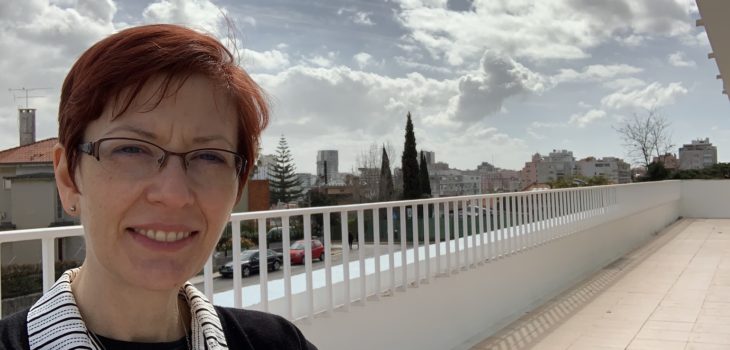
Firsts in Portugal: Solving ‘problems’ one at a time
I’ve been having a lot of “firsts” in Portugal — first-time experiences because I’m in a new place.
Upon reflection, most everything I’m encountering could be viewed as “problems” to be solved. At one time, I likely would have viewed them that way.
In fact, when I had a couple of issues come up, I wanted to fall back into that pattern of thinking: Oh, no. What if this happens?
But, I realized, I’m in control, and everything will work out. Instead of focusing on the negative, I envisioned what I wanted to happen, and voila — I got what I wanted.
Firsts in Portugal
- My first Uber. Technically, it was my second. The first driver couldn’t find me — I had been wondering how he would with so many people coming and going — so I was charged a non pickup fee. I messaged the second driver: “Hat. Orange bag.” He found me immediately. Sometimes it’s good to stand out.
- First time trying to get into a building when I didn’t know the apartment number, the doors were locked and I need to be buzzed in. And I couldn’t call or text because my phone plan doesn’t work outside the US.

I realized it would be really helpful if someone who lived there came by, because surely they could tell me which number to push. Just then, my hostess’ boyfriend came downstairs to take out the trash, and I asked if he knew her. Problem solved. - First time looking for a “Chinese shop.” I brought a travel adapter with me, but it didn’t work with the three-prong grounded power supply for my laptop. My hosts suggested I go to the “Chinese shop” — because everything sold there is made in China. I found the shop, but I did not find an adapter. However, I did find a universal power supply, which charges and powers my laptop. Another problem solved.
- First time asking someone on a service help desk if he spoke English. I Skyped PayPal’s 800 number to resolve an issue — you can’t do two-factor authentication when you can’t get texts on your phone because you’re in another country. (That should be it’s own article, so others can learn from my mistakes!) Because the Skype call was through my computer, it noted my location and defaulted to Spanish. I figured out enough to know I had to press numbers. Zero it was until the young man answered. He said he was learning English, but he could put me in touch with the English-speaking department when I explained I couldn’t speak Spanish! Someone was able to help verify my identity without sending a text, and I was able to transfer money between accounts. Problem solved! (Many thanks to my boss for tipping me off that you can Skype 800 numbers for free!)
- One problem is still unsolved at this point. Mailchimp, which I use to send emails to my subscribers, also uses two-factor authentication. Because I only use the free service, I can’t get technical support. My options are to not send emails for three months, to start a new account, or to try a new provider. Whichever way I go, it’s not a perfect scenario, but it will work out.
‘Not firsts’ in Portugal
Some “not firsts” from the past few days, but still nice:
- I live with a lovely woman. She and her boyfriend are both very nice and helpful. I’ve been very fortunate with my living arrangements in the past year, thanks to the wonderful people who have helped me. It continues!
- My new home is nice flat with a huge balcony. It wraps around the three exterior walls. My window opens onto it. When it stops raining, it will be a glorious place to dine, read, work, do yoga or enjoy a glass of wine.
- Pets are well-loved in my new home. My sister has a dog and cat, both wonderful pets, so I’ve been with pets for a number of months now. My hostess has two cats, who are warming up to me. I’m sure we will become good friends.

Pesteh and Keshmesh - The fresh market is amazing. Fish I can’t even describe — no idea what it is or how you prepare it! All sorts of fruits and vegetables. Friendly vendors. The woman who sold me produce talked me into cilantro for “salsa.” It wasn’t my plan, but it was a good idea, so I made pico de gallo. Oh, and she spoke no English. Fortunately, buying fresh stuff is easy enough. You pick it up, she weighs it, bags it and gives you a price.
Every day brings something new to learn, to do, to solve. At one time, I might have felt overwhelmed or wondered “Why me?” Now, I try to look at what I want to have happen instead of focusing on what I can’t change. I didn’t bring the right adapter? What do I need to do to get my laptop to work? I can’t transfer money between my accounts? How can I talk to someone to fix it?
My firsts in Portugal will continue, probably up until I move on to my next destination. And then, you know what that means: More “firsts” to solve.
Be a Better Writer Tip
We’ve talked a lot about preparing for the interview and the questions you’ll use. Now, let’s discuss how you actually conduct an interview.
- First, greet your subject. If appropriate, exchange pleasantries. (At the newspaper, I didn’t ask how someone was doing if I was calling to follow up on bad news.)
- Explain how the interview will go. If you haven’t already done so, explain what you hope to accomplish with the interview, what you’ll use it for, when it will be published – that sort of thing. Sometimes you will have shared this information when you set up the time to do the interview. Unless you’re covering breaking news, you may wish to call and schedule a time for the interview.
- Start by asking your subject to say and spell his or her name, title and any other pertinent information you may need, such as business name, website, address, etc. Verify you have it spelled correctly by spelling it back. One of the worst things you can do is spell someone’s name wrong.
- Begin with your questions. Choose something easy to start, something to put your subject at ease and get him or her talking.
- Listen to what he or she says. Does it bring up more questions? Go ahead and ask them. You don’t have to stick to your scripted questions only. They are there to give you a framework, but let the interview lead you to the good stuff.
- If you’re doing the interview in person, pay attention to the person’s body language. Look at him or her as often as you can, not just at your notes.
- Take notes. Even if you’re recording the interview (which is likely a good idea if you’re new to interviewing), take notes. As a reporter, I rarely recorded an interview, but I took copious notes. I had to come up with a story, complete with accurate quotes, so I had to take very good notes. Of course, no one else could read them, because it was my own sort of short hand. If I wasn’t going to write the story for a while, I’d go over my notes afterward and rewrite anything I might not recall or understand or anything I might question later.
- When you’ve asked all of your questions, always ask one more. It’s a variation of this: Is there anything else I should know about this? Or, is there anything I didn’t ask that you thought I would? Usually, you’ll get nothing, but once in a while, you’ll get a real gem – a great quote, anecdote or a piece of information that’s key to the whole story.
- Thank your subject for his or her time. Ask him or her if you can get back in touch if you have any more questions or for clarification.
- End the interview.




2 COMMENTS
Congratulations on making your dream come true. You are rockin’ it girl. Keep following your dreams.
Thank you, Jan! It’s so good to be here, but it’s almost like a dream. I keep wondering if I’ll wake up!